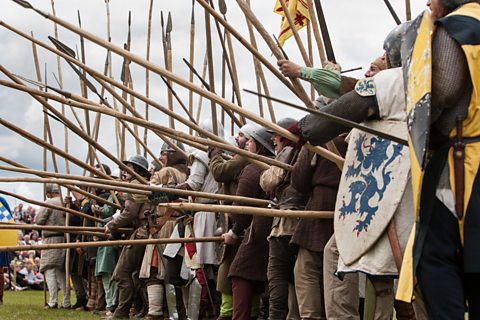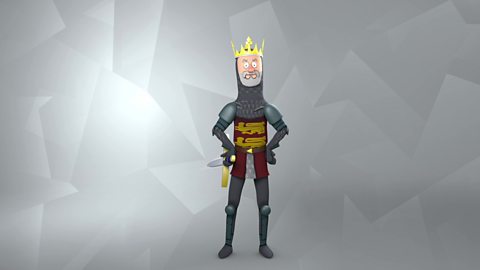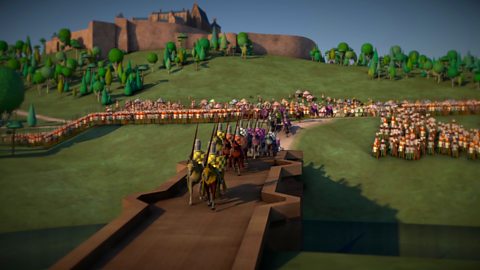Robert the Bruce is remembered as a great warrior and the king who won Scotland its freedom during the Wars of Independence.
Find out about Robert the Bruce
NARRATOR:The Wars of Independence. King Robert the Bruce! 1274 -1329.
Are you ambitious? Want to be somebody? How far would you go to get what you want?
Well, Robert the Bruce was someone who knew how to get what he wanted.
The Bruces were a rich family with land all over Scotland and England. They were ambitious!
Robert’s Grandpa could have been King of Scotland but it never happened. But the Bruce Family were still hungry for power.But Robert was hungry to learn too! He could speak three languages: French like his Father, Gaelic like his Mother and Scots because he grew up in Scotland.
He could read and write – which not everybody could do at the time. He loved to read books all his life. He learned about great heroes from history – maybe that’s what inspired him to become one?
But he wasn’t very heroic to begin with. Sometimes Robert fought for the Scots, if it suited him. Sometimes, he fought on the English side. He didn’t want his family to lose the land they owned in England.
Robert was desperate to be King of Scotland. In 1306, Robert even stabbed his main rival for the Scottish throne, John Comyn, in a church – and Comyn died.
With his rival out the way, Bruce could now become King.
Robert the Bruce was made King of Scotland in March 1306. King Edward the First of England was furious because he wanted to be in control of Scotland. But he died soon afterwards.
King Edward’s son, Edward II took control of England’s army. Robert still had a fight on his hands.
Bruce didn’t like open battles because the English Army was bigger and stronger.
So he had to be clever. Take his time. Run. Attack. Hide. The English said he was like a fox.
He didn’t always win, but when he did, it was because he was clever.
As King, Bruce spent eight years taking Scotland back from the English, Castle by Castle.
The English King, Edward the second, sent a huge army into Scotland but Bruce’s army beat them beneath the Stirling Castle at Bannockburn.
King Robert ruled Scotland for another fifteen years, finally achieving peace with England.
In 1329 King Robert died leaving his son, David to be King.
Bruce’s ambition to be King paid off. Not only did he free Scotland but he started the line of Royalty which all the Kings and Queens of Great Britain are related to. Even to this day.
QUEEN ELIZABETH II:Mm, hmm.
NARRATOR:Ambition achieved.

Who was Robert the Bruce?
Robert came from a noble family that had a claim to the throne of Scotland.
After the death of and , Robert's grandfather almost became King of Scots in 1292. became king in stead.
The Bruce family held a lot of land in England and sometimes the family supported with the English king, .
After Edward I defeated the Scottish army at the and got rid of King in 1296 , Bruce supported the rebellion against Edward's control.

How did Bruce become king?
First, Bruce joined the rebellion that had begun with 's battles at and .
After Wallace went into hiding after defeat at the Battle of Falkirk, Bruce was made a Guardian of Scotland. Bruce had bigger ambitions, though - he wanted to be king.
In 1306 he met his main rival for the throne of Scotland, John Comyn, at Greyfriars Monastery in Dumfries, to discuss who should be king and fight back against Edward I.
A fight broke out and Comyn was killed. The church supported Bruce and later that year he was made King of Scots.
Bruce facts
- Robert was born in 1274 - probably in Ayrshire
- In February 1306 he stabbed his rival, John Comyn, in Greyfriars Monastery, Dumfries
- In March 1306 Robert the Bruce became King of Scotland
- In June 1314 he won his greatest victory at the Battle of Bannockburn
- He died in 1329
- His body is buried at Dunfermline Abbey but his heart is buried at Melrose Abbey

How did Bruce free Scotland?
Bruce didn't get off to a great start. He was defeated at the Battle of Methven in 1306, had his wife and daughter and his sisters captured and his brothers killed by the English.
Bruce went on the run but then returned and started to attack the castles that English forces controlled in Scotland.
Finally, King Edward II - the son of Edward I - marched an army north to find and beat Bruce.
At the in 1314, Bruce defeated Edward's army. In 1329 Scotland and England signed a peace treaty. The Wars of Independence were over!

More on Wars of Independence
Find out more by working through a topic
- count6 of 13

- count7 of 13

- count8 of 13

- count9 of 13
